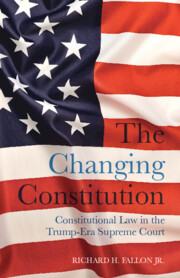Book contents
- The Changing Constitution
- The Changing Constitution
- Copyright page
- Dedication
- Contents
- Introduction
- 1 The Written Constitution and the Emergence of Judicial Supremacy
- 2 Historical Overview of Constitutional Adjudication by the Supreme Court
- 3 The Supreme Court Today
- 4 Freedom of Religion
- 5 The Freedom of Speech
- 6 The Expanding and Contested “Right to Keep and Bear Arms”
- 7 The Equal Protection of the Laws
- 8 Substantive Due Process and Unenumerated Fundamental Rights after the Overruling of Roe v. Wade
- 9 The Shrinking yet Still Formidable Powers of Congress
- 10 The Powers of the President and the Executive Branch in a Period of Ferment
- 11 Law and Change in the Supreme Court
- Index
8 - Substantive Due Process and Unenumerated Fundamental Rights after the Overruling of Roe v. Wade
Published online by Cambridge University Press: 21 August 2025
- The Changing Constitution
- The Changing Constitution
- Copyright page
- Dedication
- Contents
- Introduction
- 1 The Written Constitution and the Emergence of Judicial Supremacy
- 2 Historical Overview of Constitutional Adjudication by the Supreme Court
- 3 The Supreme Court Today
- 4 Freedom of Religion
- 5 The Freedom of Speech
- 6 The Expanding and Contested “Right to Keep and Bear Arms”
- 7 The Equal Protection of the Laws
- 8 Substantive Due Process and Unenumerated Fundamental Rights after the Overruling of Roe v. Wade
- 9 The Shrinking yet Still Formidable Powers of Congress
- 10 The Powers of the President and the Executive Branch in a Period of Ferment
- 11 Law and Change in the Supreme Court
- Index
Summary
This chapter examines the Supreme Court’s practice, over approximately a century and a half, in developing and applying the “substantive due process” doctrine. The animating premise of that doctrine is that the Due Process Clause confers judicially enforceable protections against substantively unfair infringements of certain “unenumerated” yet fundamental or important rights. After the Court’s embarrassed climb down during the 1930s from a line of decisions enforcing rights to freedom of contract, the Court reembraced the Due Process Clause as a source of “unenumerated” rights in Roe v. Wade (1973) and, later, in decisions protecting rights to engage in private acts of sexual intimacy and extending the unenumerated right to marry to same-sex couples. Although the current Court overturned Roe in Dobbs v. Jackson Women’s Health Organization (2022), the majority opinion avoided a strictly originalist approach by embracing precedents holding that the Due Process Clause protects some fundamental substantive rights that are grounded in “tradition.” The chapter explores the conservative justices’ reasons for adopting that position. It also considers whether substantive due process decisions invalidating prohibitions against sodomy and laws defining marriage as necessarily involving one man and one woman can survive under the rationale of Dobbs.
Keywords
Information
- Type
- Chapter
- Information
- The Changing ConstitutionConstitutional Law in the Trump-Era Supreme Court, pp. 210 - 238Publisher: Cambridge University PressPrint publication year: 2025
Accessibility standard: WCAG 2.0 A
Why this information is here
This section outlines the accessibility features of this content - including support for screen readers, full keyboard navigation and high-contrast display options. This may not be relevant for you.Accessibility Information
Content Navigation
Allows you to navigate directly to chapters, sections, or non‐text items through a linked table of contents, reducing the need for extensive scrolling.
Provides an interactive index, letting you go straight to where a term or subject appears in the text without manual searching.
Reading Order & Textual Equivalents
You will encounter all content (including footnotes, captions, etc.) in a clear, sequential flow, making it easier to follow with assistive tools like screen readers.
Structural and Technical Features
You gain clarity from ARIA (Accessible Rich Internet Applications) roles and attributes, as they help assistive technologies interpret how each part of the content functions.
